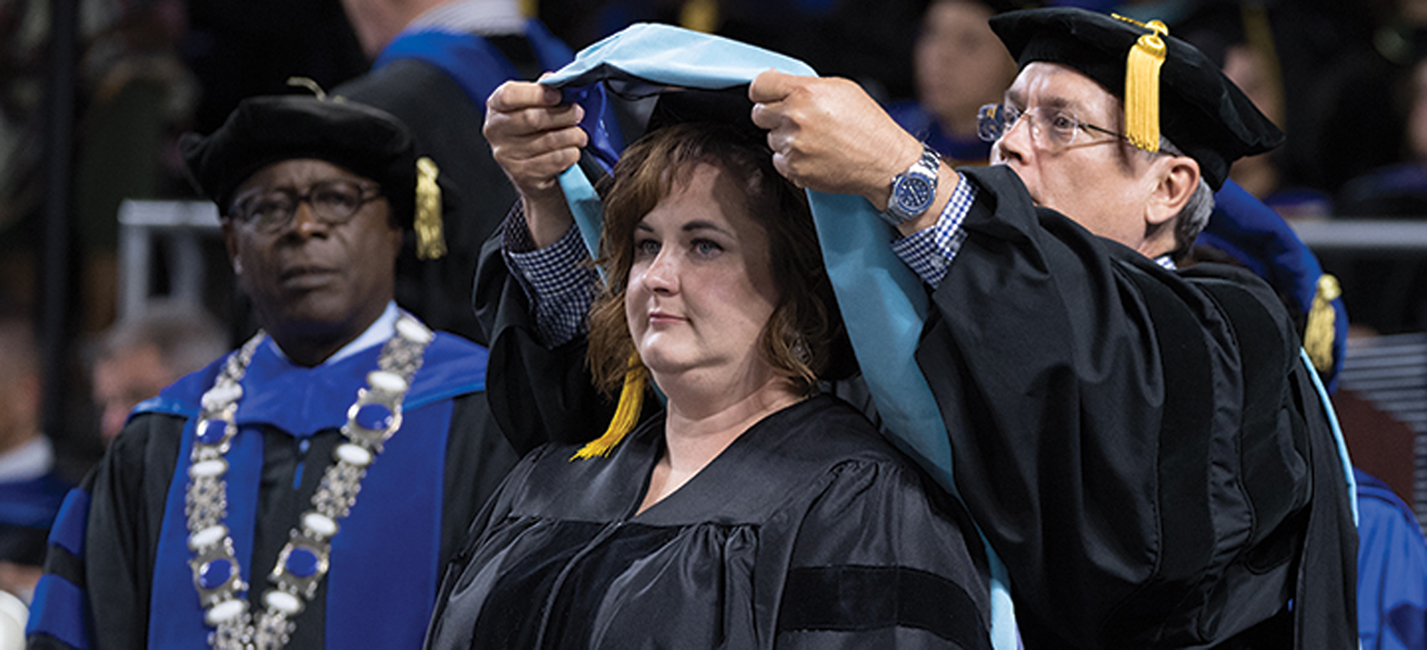The College of Education’s newest doctoral program produces its first wave of graduates
In 2013, the College of Education launched a first-of-its-kind doctoral degree—the Ed.D. in Assessment, Learning, and School Improvement. It was the culmination of 40 years of work by MTSU faculty and administrators to gain approval for a doctoral program in the College of Education focused on the improvement of K–12 teaching and learning.

The new degree was also the fulfillment of a challenge issued by MTSU President Sidney A. McPhee to then-new college dean Lana Seivers to, at long last, develop a doctoral program in the college that was unlike any other in the country. The college—in collaboration with state governing bodies—got the program up and running much faster than anyone could have imagined. After many long hours and several iterations, TBR and THEC approved the first and only education doctorate in Assessment, Learning, and School Improvement during the summer of 2012. Just one year later, in August 2013, after a diligent and rigorous application and selection process, the college’s first group of students began the program. Starting in that first semester, students engaged in projects that directly improved teaching and learning n schools and districts across Tennessee. By the end of the first year of coursework, students and faculty in the first cohort initiated more than 150 of these field-based research projects focused on the needs in local schools and school districts.
Three years later, in August 2016, the college very proudly graduated its first 10 candidates from the new doctoral program (which constitutes half of the college’s first cohort of 20 students). Education professionals from across the state and beyond have been making the commute to MTSU to take advantage of the program, in large part because it is unlike any other in the country. It has specifically attracted educators seeking to enhance their knowledge and careers while using what they’ve learned to make an immediate difference in the lives of K–12 students.
Program director and now associate dean Rick Vanosdall said students seeking the degree, who participate in an executive education environment on weekends, dive deep into the research on what works in K–12 and then develop projects to implement in their own professional environments.According to Vanosdall, the projects are intended to pinpoint and support school and district initiatives for improving student learning. As students progress through the program, they develop and complete their dissertation research focused on every aspect of the three pillars of the program Assessment, Learning, and School Improvement. Many of these students have already received accolades locally and nationally through their research publications and presentations.
“One of the unique features of the program is that people aren’t learning theory to apply someday down the road,” he said. “They’re doing it right now.”

The new doctoral program was developed and launched back in 2012–13 under the watch of Paula Myrick Short, the former vice chancellor for academic affairs for the Tennessee Board of Regents. Short, now senior vice chancellor for academic affairs for the University of Houston System and senior vice president for academic affairs and provost for the University of Houston, offered praise for the program’s success and first graduates.
“This degree accomplishes the vision of both Dean Lana Seivers and the faculty to continually strive for excellence in teaching and learning in our PreK–12 classrooms, and gives leaders and researchers in higher education tools for success,” Short said. “Through my past work for the Tennessee Board of Regents, I am elated to see the hard work and dedication of these individuals impact future change as these newest educators shape young minds. The newest graduates of the Doctor of Education program for Assessment, Learning, and School Improvement will enter the workforce with a unique degree that will allow them to think critically about teaching in PreK–12 classrooms and use data-driven methods for continual improvement of schools at all levels.”
With the addition of the second and third cohorts, the college continues to expand its positive influence making substantive improvements for students in schools and school districts from Johnson City to Martin in Tennessee, and as far south as Birmingham, Alabama.
In August 2016, the college started its fourth cohort of doctoral students with a partnership with Maury County Schools, where the college is working alongside the senior district leadership team to leverage school district improvement initiatives with doctoral level coursework. With this adaptation to focus on integrating doctoral coursework and projects with school district initiatives, and the college’s expanding network of graduates, students, and school district partners, MTSU currently has a two-year waiting list for district team-focused programs.
By Drew Ruble
To read this Aspire Magazine story and others: Aspire
Have any questions or comments? Contact us at: Darby.Campbell@mtsu.edu


COMMENTS ARE OFF THIS POST